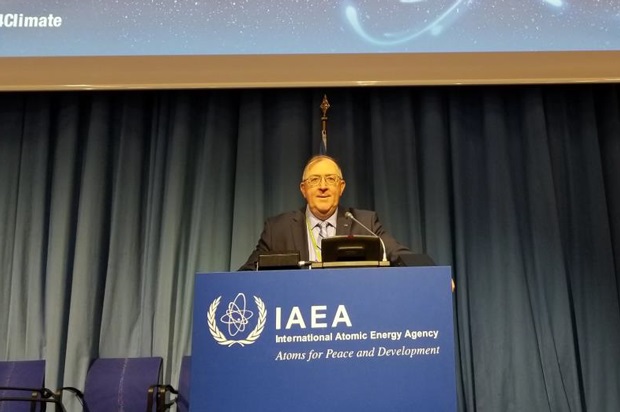Over an illustrious career as a leading international authority on nuclear power, Ontario Tech University's Dr. Igor Pioro has seen a lot of global debate about the future of energy and the shift away from fossil fuels.
One of the hottest topics in the world today (12/6) is climate change and arguments as to the extent that human activities are impacting that change.
"The naysayers suggest any apparent climate changes are due to nothing more than normal cycles of the Earth and the Sun," says Dr. Pioro, a Professor with Ontario Tech University's Faculty of Energy Systems and Nuclear Science (FESNS). "Are these claims based on reason and evidence? Should the world simply do nothing? What if those naysayers are wrong?"
Researchers and scientists like Dr. Pioro say climate-change indicators are everywhere, and that the evidence is compelling. They point to rapidly melting glaciers in polar regions and mountains, ocean acidification, rising sea levels, weather pattern changes, rising global temperature and the disappearance of species.

Ontario Tech University's Dr. Igor Pioro addresses delegates in Vienna, Austria at the International Atomic Energy Agency's 2019 Conference on Climate Change and the Role of Nuclear Power (October 2019).
"The energy choices all countries make have profound implications for the planet's natural systems, from the consumption of finite resources to the carbon dioxide produced by fossil fuel combustion that affects global temperature," says Dr. Pioro, who is also the Founding Editor of the American Society of Mechanical Engineers' Journal of Nuclear Engineering and Radiation Science. "With energy, there are always huge economic factors at play, as well as political and social considerations. But we know that access to reliable, clean and cost-efficient energy is essential to our quality of life. The question is: what are the most viable and reliable sources of energy not just for today, but for beyond the next century?"
Energy Systems and Nuclear Science at Ontario Tech
To explore and develop answers to such questions, Ontario Tech University created FESNS, a full-rank undergraduate and graduate degree-producing faculty that has assembled leading energy-research experts from around the planet. From small beginnings in 2003, Ontario Tech University is now one of North America's largest nuclear-engineering schools. In Canada, Ontario Tech is the largest, and the only university offering specific nuclear-engineering degrees, right up to PhDs.
On the horizon in nuclear technology (circa 2030) are the fourth' generation (Generation IV) reactor concepts that will offer significant advances in efficiency, affordability, sustainability and safety.
"This might be challenging for many to consider, but the truth is that it's already time to be thinking about energy in the context of the 22nd century," says Dr. Pioro. "When it comes to free-carbon-emission energy sources, nuclear power will be the most viable and most strategic source for electricity generation, because reactors are carbon neutral. That's what Ontario Tech is about: developing the highly qualified engineers, scientists and managers to lead for the world's next generation of energy production."
Ontario Tech University an international player
In October, Dr. Pioro presented his vision for nuclear power (Session 2, beginning at 39th minute in the video) to the first International Atomic Energy Agency's (IAEA) 2019 Conference on Climate Change and the Role of Nuclear Power, in Vienna, Austria. More than 500 experts, executives and delegates representing nearly 80 countries took part in the conference.
"Nuclear power must operate and compete in energy markets based on relative costs and strategic advantages of the available fuels and energy types," says Dr. Pioro, who shared details at the IAEA Conference of a paper he co-authored with American nuclear scientist Dr. Romney Duffey (entitled Current Status and Future Developments in Nuclear-Power Industry of the World).
Advantages of nuclear power, according to Dr. Pioro:
- Concentrated and reliable source of almost infinite energy.
- Energy production independent of weather.
- Reliability: reactors have long operating cycles with high capacity, suitable for continuous base-load operation.
- Compared to fossil-fuel thermal power plants:
- Essentially negligible operating emissions of carbon dioxide.
- Relatively small amount of waste generated.
- Smaller amount of fuel required.
Issues to manage in spite of all current technological advances in nuclear power:
- Generation of radioactive waste.
- Water-cooled-reactor nuclear power plants have relatively low thermal efficiencies (30 to 38 per cent) compared to modern advanced thermal power plants (55 to 62 per cent).
- Risk of radiation release in a severe accident.
- Mining and refining of nuclear fuel (such as uranium) is not an environmentally friendly process.
Dr. Pioro says these issues should be resolved in the coming decade as Generation IV reactors become ready for deployment.
Related links:
- Pioro participated in the recent video The Chernobyl Conspiracy on the 1986 Chernobyl Nuclear Power Plant accident aired on the Science Channel on October 9, 2019.
- Pioro edited the world's first Handbook of Generation IV Nuclear Reactors (Elsevier, 2016).











